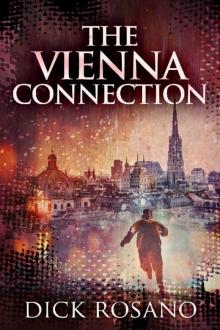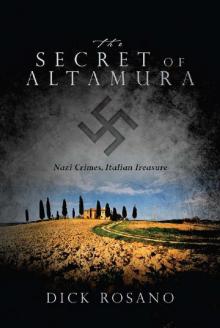- Home
- Dick Rosano
The Vienna Connection
The Vienna Connection Read online
The Vienna Connection
Dick Rosano
Contents
Chapter 1
Chapter 2
Chapter 3
Chapter 4
Chapter 5
Chapter 6
Chapter 7
Chapter 8
Chapter 9
Chapter 10
Chapter 11
Chapter 12
Chapter 13
Chapter 14
Chapter 15
Chapter 16
Chapter 17
Chapter 18
Chapter 19
Chapter 20
Chapter 21
Chapter 22
Chapter 23
Chapter 24
Chapter 25
Chapter 26
Chapter 27
Chapter 28
Chapter 29
Chapter 30
Chapter 31
Chapter 32
Chapter 33
Chapter 34
Chapter 35
Chapter 36
Chapter 37
Chapter 38
Chapter 39
Acknowledgments
About the Author
Other Books by Dick Rosano
Other Books by D.P. Rosano
Copyright (C) 2019 Dick Rosano
Layout design and Copyright (C) 2019 by Creativia
Published 2019 by Creativia (www.creativia.org)
Edited by Fading Street Services
Cover art by Cover Mint
This is a book of fiction inspired by real events. Any similarity to real persons, living or dead, is coincidental and not intended by the author.
All rights reserved. No part of this book may be reproduced or transmitted in any form or by any means, electronic or mechanical, including photocopying, recording, or by any information storage and retrieval system, without the author's permission.
For more information, go to www.DickRosanoBooks.com
Praise for Dick Rosano’s Books
Dick Rosano’s books – published in English – have also been translated into three languages: Italian, Spanish, and Portuguese, and continue to command attention around the world.
The Secret of Altamura: Nazi Crimes, Italian Treasure
“If you’re a fan of Italy, this book is for you…Rosano skillfully blends all three themes into one well-written, emotionally engaging narrative that moves at a good pace.” (ReadersFavorite.com)
A Death in Tuscany
“If you want to read a book that introduces you to the culture of wine making, an appreciation of the countryside of Tuscany, and a lifestyle that appreciates good food and good wine, this book excels.” (Five Stars). (Barnes & Noble)
“The book is as much a crime novel as it is an authoritative travelogue and wine tutorial, an enjoyable read for Tuscany aficionados in particular.” (Ambassador Magazine)
Hunting Truffles: A Mystery
“Hunting Truffles travels through the Piedmont region after the lucrative white truffle harvest has been stolen, the plot thickens as the bodies of truffle hunters are discovered! We can't wait for the movie!” (Bethesda Travel Magazine)
Wine Heritage: The Story of Italian-American Vintners
“Original in conception, well-researched and deftly written, this book casts a long-overdue light on a fascinating corner aspect of America’s wine history.” (The Washington Post)
Chapter One
April 14
Stadtpark, Vienna
“Hey.” I heard the voice from a foggy distance. “You can’t sleep here.”
I felt a gentle kick on the sole of my shoe.
Okay, I thought, reaching up with my right hand to still the pounding in my head. I could tell that I was lying on the ground, on a grassy field, but the rest was hazy. Fuzzy images in the distance suggested trees, and a building loomed off to my right.
My eyes blinked open and I stared up at a uniformed officer. Another few blinks and I guessed from her beret and blue outfit she was from the Austrian polizei.
“Come on, get up,” she said, this time without a kick.
Obeying her command was not easy. I tried to push up with my hands but then had to roll over onto my knees to get off the ground. Balance had abandoned me, but I kept moving to show that I was complying with her order.
When I finally got to my feet, I turned toward the officer. She was my height and, even with my blurred vision, I could tell from her voice that she was young. I strained to see more clearly. Brown hair, neatly tied and kept in place under her beret, the red epaulets proof of my earlier guess that she was police. I didn’t know the system or police organization in Vienna, so I couldn’t tell her rank, but I supposed that the appearance of a single star on the epaulet meant something.
“What is your name, sir? And why were you sleeping in the Stadtpark?”
I looked at her again and tried to focus my eyes while steadying my wobbly legs.
“Have you been drinking?” she continued.
Too many questions, but I knew I should start with the first.
“Darren.” Somehow my brain couldn’t come up with my own last name. Then, “Darren…Priest. I wasn’t sleeping, I was…”
“You were asleep, and that is not allowed here. Do you have a hotel room?” she asked.
“Yes, but how did I…,” but then I stopped. I didn’t know how I had ended up in the park, asleep on the ground. From the sun, it appeared to be mid-afternoon and I had no recollection of getting here or why I was here. Still, I knew it would be a bad strategy to ask her how I got here. Sleeping is one thing; sounding intoxicated or disconnected was worse.
“I’m…I’m staying at the Marriott. Over there,” I said, pointing to the tall gray building across the road. Some details were coming clearer to me, but not the time of day, or even the day itself, or the events preceding this moment.
Slowly, snippets of memory began to refill the calendar in my brain in reverse order. I recalled having coffee and a croissant in the Marriott restaurant at breakfast and then, remembering backward, a hazy memory of walking down the corridor from my room to the second floor to the restaurant. As these details cleared from a blurry gray, other moments gathered in line behind them. I woke that morning, early as usual. I showered and dressed. The evening before was slowly coming into view, including the dinner at Figlmüller last night. The half bottle of Weissburgunder Pinot Blanc and the wiener schnitzel that was so large it overlapped the edges of the plate. There was no one sitting with me, no one to talk to. I bantered with the waiter to fill the void.
I remembered it is an uneventful meal, except for the excellent food that I had often enjoyed at Figlmüller. The waiter was pleasant, the wine satisfying. Paying close attention to detail, I could focus on the time after the dinner when I walked back to the Marriott, sipped a Single Malt Scotch at the hotel bar, then went to bed. Nothing stood out to me as indicating any impact on my ability to think or function.
“Well, you can’t sleep here,” the young officer repeated, bringing me back to the present. She turned to leave, then stopped and turned back to me again.
Something in my memory of the morning kept infiltrating my thoughts and kept me from promptly responding.
“Let’s go!” the officer said with a more commanding tone.
The slight tick in the film of my memory was about breakfast, and something seemed out of sorts. There was something that didn’t belong, but I couldn’t quite put my finger on it.
“Please pick up your things and return to your hotel,” she said, waving her hand at my backpack and the few items that had spilled from it onto the ground.
The face of a man came into mind. He had a sturdy build and I pictured him talking to the
waitress who tended to my table at breakfast. I strained to focus on the snapshot in my memory. He was in his early fifties, maybe late-forties, white, medium height, a full head of salt-and-pepper hair, tiny tattoo on the back of his wrist that was partly covered by the long sleeve of his shirt. He glanced in my direction once, then turned back to the waitress. Probably the restaurant manager.
“Now!” the police officer barked.
“Okay!” I replied with some edginess, then it hit me. “Wait!” I added, putting my hand up. The officer looked at me and grew more impatient, but I was trying to focus on the glimmer of a memory. The man’s hand touched the edge of the waitress’s tray. He looked at me again and then the waitress looked in my direction. Then the film clips streaming through my memory went blank.
The officer kept her silence but planted her fists on her hips in an obvious show of displeasure. I knew that further delays in complying with her command could end up with me being arrested or searched. And neither seemed like a good thing at the moment.
Ignoring the memory film that seemed to have stalled anyway, I knelt gently to the ground to collect my Samsung smartphone, billfold with some Euros, and my passport that had fallen out of the bag.
Standing quickly, another memory snapshot skittered across my brain. I couldn’t hold it, but the short-term recording offered a brief glimpse of the man taking the tray from the waitress while she turned toward the counter to retrieve the espresso cup. The man took the espresso from her, lowered it to the tray, and handed the tray to her. And she turned in my direction to deliver the espresso. But before she could take a step, the film stalled once again. That was all.
No, wait, that wasn’t all. Why was he holding the espresso saucer with both hands, one hand on the saucer itself and one hovering over the tiny cup of coffee?
The officer stood next to me with her hands on her hips, barely tolerating my herky-jerky response to her commands. I was working to recover my memory of breakfast, which she couldn’t possibly know, but she granted me a bit more leeway, seeing that I was not completely stable on my feet.
I felt drunk but couldn’t be. Drugged possibly. Did my breakfast have anything to do with it?
I returned to collecting my things only to realize that my laptop was gone. Phone, wallet, and money were there, but no laptop.
“Wait,” I said reflexively.
The officer was still waiting for me to act and she didn’t look happy at my further command to wait. I had uttered it more as a mental pause, not an order for her, but under the circumstances she had every reason to doubt my intention. I pulled the remaining things out of my backpack, including baseball cap, sunglasses, and two books, but there was no laptop.
“My Galaxy isn’t here,” I said.
“Your what?” she asked, stepping back toward me.
“My Galaxy. It’s a laptop. It’s not here.”
She returned to where I was crouched on the ground and stood looking at me.
“Are you sure you didn’t leave it in the hotel?” she asked, crooking her thumb toward the Marriott.
“Yes,” I said, “well, no. I mean I’m not sure.” I stopped, fearing my recitation of mostly forgotten facts could get me into even hotter water.
She spun a little to the left and then to the right, hands still on her hips, and looked back at me after surveying of the area.
“I don’t see anything here,” was her conclusion.
Still kneeling, I scanned the ground around me. A few dozen people were scattered about, sitting on the grass, but they were all spread out, so the area around me was clear of bodies. I, too, found no sign of my missing tablet. Hoisting myself to my feet, carefully so as not to stumble, I turned to the officer. My vision was clearing, and I could now see that she had brown eyes to match her hair, minimalist makeup, and pale red lipstick.
And a Glock 17 semi-automatic pistol and pepper spray strapped to her belt.
“It’s not here,” I said quietly.
“Do you think someone stole it while you were sleeping?”
“I wasn’t slee…” I began but caught myself. “Yes, possibly.”
“What was on it? And why didn’t they take your Euros and phone, too?”
I was already getting tired of her asking multiple questions at once.
“It had my files, my records…”
“What kind of records? Personal or business?”
With the return of my vision came a return of my wits, so I decided not to answer that question.
“Just things.” I opted for misdirection.
Sensing my reluctance to cooperate, she turned once again to leave, then paused.
“Do you want me to look around some more?” she asked.
I hesitated. I wanted her help, but if the polizei were the ones to find my computer they might want to review its contents. I was sure I didn’t want them to ask any questions about the files that I had there.
“No, thanks,” I replied, and, just as quickly, I realized that my response was implausible and would raise suspicion. As I feared, my reply turned her back onto the search rather than sending her away.
“Mr. Priest,” she said, looking at me with suspicion. “I am Inspector Weber. I will help you find your computer.”
I rose to my feet and began walking from my spot in a spiral outward in ever greater arcs. Weber had a more direct style. She began from the point where she found me and walked in a straight line, sweeping her gaze left and right to cover a funnel-shaped sector out from the starting point. Finding nothing, she returned to point of origin, turned to another compass point, and repeated the straight line in another direction. She went about thirty yards out in each direction before returning, piecing together these pie slices of the three-hundred-and-sixty degrees until she had scanned the area, with me wandering in circles past her.
The area was mostly mown grass, but there were some small shrubs, so each of us bent down and looked underneath the low branches and into the tall weeds that had clustered at their base.
After about twenty minutes, Weber stood facing me.
“There’s nothing here. Perhaps you left it in your hotel room,” she said again.
“No, I didn’t.” This time I was a bit more emphatic, certain that I had not left the computer in the hotel or unprotected during an impromptu nap in a public park, for that matter. This last thought left me confused and unnerved.
Of course, I was equally certain that I wouldn’t allow myself to be drugged in public.
“I encourage you to return to the Marriott,” she advised. “And when you do, you should rest, and maybe take something to recover from your hangover.”
I felt like shit, but I had no reason to think I was hungover.
“Here’s my card.” She handed me a business card with Bundespolizei printed at the top and a symbol of the organization. Below it, centered, was her name, Alana Weber, and beneath that her rank, Inspektor.
“Call me if you decide to file a report, Mr. Priest.”
Chapter Two
April 14
Champions Bar
After Weber left, I glanced around the area again, found nothing, and resigned myself to the fact that my laptop had been stolen. I kept important files there, but none that would harm me or assist the thief. Still, I had compiled information that I needed, particularly in the work I had planned for this visit to Vienna. Fortunately, my obsession with information also drove me to maintain copies, in this case on a flash drive that I always carried with me. Slipping my hand into my right pants pocket, I found it there, attached to the long lanyard that I always kept with it.
I zipped the backpack shut and slung it over my shoulder, then turned toward Parkring, the main avenue that hugs the contour of Vienna’s old city on this side. At the pedestrian light on the curb, I stood for a moment until the light switched to green, then I crossed the street with the joggers, walkers, and pets and walked directly up to the entrance of the Marriott Parkring.
Just as I anticipat
ed, the laptop was not in my hotel room, nor in the restaurant. I checked with the manager. The waitress was off shift by the time I returned in late afternoon and she didn’t recall anyone finding a small computer, or a man fitting the description I provided.
I scanned the room, checking the faces of the wait staff on shift at that time to see if I could find the man I remembered from the morning. Then I approached the manager on duty.
“I’m looking for a man, sturdy build, slightly graying hair, maybe a manager or something?” I asked.
“When were you here?”
“At breakfast.”
“About how old was he?” the manager asked.
“Maybe fifty, give or take a few years.”
“Well, no, we don’t have a manager who fits that description. In fact, the manager on the breakfast shift is a woman.”
“Could he have been a waiter?” I asked.
“No. As you can see, the servers here are all younger than you describe. Like the waiters in your restaurants in America. There is no one here of the age you describe.”
I looked at the manager. He was older than his wait staff crew, but I wasn’t looking for him.
Anticipating my question, he said, “I was the manager on shift this morning. Still here, I regret to say, but there was no one forty-something with gray hair working today.”

 Hunting Truffles
Hunting Truffles The Vienna Connection
The Vienna Connection The Secret of Altamura: Nazi Crimes, Italian Treasure
The Secret of Altamura: Nazi Crimes, Italian Treasure